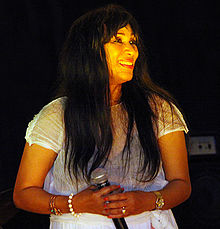Aster Aweke
Aster Aweke አስቴር አወቀ | |
|---|---|
 | |
| Background information | |
| Born | 1958 (age 65–66)[dubious – discuss] |
| Origin | Gondar, Ethiopia |
| Genres | |
| Instrument | Vocals |
| Years active | 1970s–present |
| Labels |
|
Aster Aweke (Template:Lang-am; born 1958[dubious – discuss]) is an Ethiopian singer. Aster's voice has attracted broader public popularity, especially tracing back in 1990s singles and her single "Abebayehosh" in Ethiopian New Year. She is known for her 1999 album Hagere, and her 2008 album Fikir. She moved in the United States in 1981, and she returned to Ethiopia in 1997.[1][2]
Early life
Aster was born in 1958
in Gondar, Ethiopia. She was raised in the capital city of Addis Ababa. Her father was a senior civil servant in the Imperial government of Haile Selassie.[2] By 1981, Aster had become disillusioned by Derg's oppressive political climate and relocated to the United States. She first settled in California to pursue education, but later relocated to Washington, D.C. (which is the city with the largest Ethiopian community in US). In 1997, after more than 15 years abroad, Aster came-back to Ethiopia and she was warmly welcomed by thousands of her loyal followers awaiting for her at Addis Ababa airport.[3]
Career
By the age of 13, Aster was determined to become a musician, and began her career at Hager Fikir Theatre in Addis Ababa.
Starting in her late teens, she was performing in clubs and hotels in the capital with bands such as the Continental Band, Hotel D'Afrique Band, Shebele Band and Ibex Band, before they became the internationally known as Roha Band.
Aster's distinct style has been influenced by other Ethiopian singers, such as Bizunesh Bekele.
Launching a solo career, she was encouraged by musical entrepreneur Ali Tango, who financed and released five cassettes and two singles of her music. By 1981, Aster had become disillusioned by Ethiopia's oppressive political climate following the death of Haile Selassie, and relocated to the United States. Temporarily settling in the Bay Area of California, with plans to pursue higher education within a period of two years, she settled in Washington, D.C., where one of the largest Ethiopian expat communities in the country existed. There, she became increasingly popular within the Ethiopian community, performing in restaurants and clubs.
Aster also remains popular in Ethiopia. In 1997, she performed in Addis Ababa for a crowd of over 50,000 people. In 2003, Aster also performed a two-part concert series to raise funds for relief and school initiatives in Ethiopia. The first concert was held in November on Eid Al-Fitr day at the Addis Ababa Stadium, with an audience of 40,000 in attendance. The second performance was a gala-dinner at the Sheraton Hotel.[4] On May 9, 2009, Aster performed in front of a crowd of 10,000 spectators during the Peace Through Unity, Unity Through Music concert held in the capital's Millennium Hall, alongside other Ethiopian music artists. Aster's eleventh album Chewa was released on July 24, 2019.[5][6]
Business ventures
Aster Aweke joined the business sector by opening a cafeteria called Kabu, which was named after her song "Kabu". [7]
Discography
- Albums
- Aster (1989, Columbia/CBS Records)[8]
- Kabu (1990, Columbia/SME Records)[9]
- Ebo (1994, Barkhanns)
- Live in London (1995, Barkhanns)
- Hagere (1998, Kabu Records)
- Sugar (2001, Kabu Records)
- Asters Ballads (2006, Kabu Records)
- Fikir (2008, Kabu Records)
- Checheho (2011, Kabu Records)
- Ewedhalew (2013, Kabu Records)
- Chewa (2019, Kabu Records)[10]
- Contributing artist
- Ethiopian Groove (1994) - The Golden Seventies (Buda Musique)
- Unwired: Acoustic Music from Around the World (1999) - (World Music Network)
- The Rough Guide to the Music of Ethiopia (2004) - (World Music Network)
- Featured singles
References
- ^ "Aster Aweke". Discogs. Retrieved 2016-04-18.
- ^ a b "All-Music "Aster Aweke:- Artist Biography by Craig Harris"".
- ^ "All-Music "Aster Aweke:- Artist Biography by Craig Harris"".
By 1981, Aweke had become disillusioned by Ethiopia's oppressive political climate and relocated to the United States. Temporarily settling in the Bay Area of California with plans to pursue an education; within two years, Aweke continued on to Washington, D.C., the site of the largest Ethiopian population in the U.S. ... When she arrived in her homeland in 1997 for the first time since she'd left in 1981, {she} was greeted by thousands of loyal followers awaiting her plane.
- ^ "Africa: Aster Aweke Sings for the People Against Hunger". All Africa. 23 November 2012. Retrieved 28 November 2012.
- ^ Insight, Addis (2019-06-22). "Aster Aweke Making a Comeback With a New Album". Addis Insight. Retrieved 2019-07-23.
- ^ "Music Mix with Aash @aashaddis". www.televram.com. Retrieved 2019-07-26.
- ^ "Ethiopian celebrity expanding into coffee export". capitalethiopia.com.
- ^ "Aster Aweke". Discogs. Retrieved 2016-04-18.
- ^ "Aster Aweke". Discogs. Retrieved 2016-04-18.
- ^ Insight, Addis (2019-06-22). "Aster Aweke Making a Comeback With a New Album". Addis Insight. Retrieved 2019-07-23.
- ^ "PRESS RELEASE-YEGNA RELEASES NEW MUSIC VIDEO FEATURING ASTER AWEKE". debirhan.com. Archived from the original on 2015-01-12.
